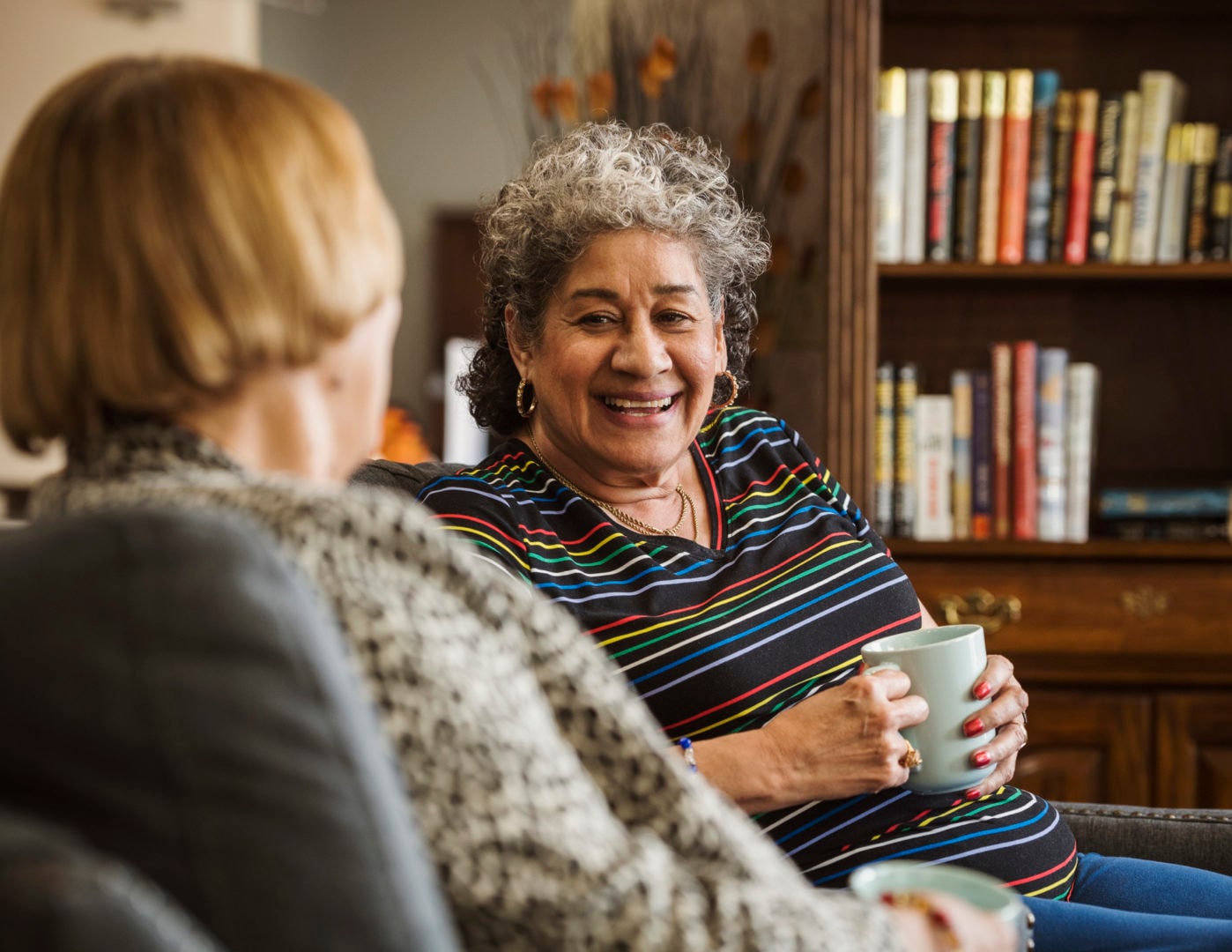When it comes to ensuring that an older adult’s lifestyle is conducive to being happy and healthy, aging in community is one avenue older adults and their caregivers might want to explore.
“Aging in community is a broader term for aging in place,” explains Dr. Tina Shenouda, a primary care physician and Chief Medical Officer for Partners in Primary Care, a network of senior-focused primary care centers throughout the country. The difference: Aging in community puts the emphasis not only on keeping people at home but also connected through social networks and community-based supports and services, so they can stay even safer at home, she says.
Read on for more on what aging in community is, how it can benefit older adults and whether it might work for you or your loved one.
What is aging in community?
Unfortunately, our communities are not always set up to support us at different stages of ability throughout our lives, says Kathy Black, a gerontologist who holds a doctorate in social welfare and is a professor of aging studies and social work at the University of South Florida Sarasota-Manatee. For instance, someone with a walker might want to go to the park, but there isn’t a safe space there for them to walk or bathrooms should they need one. Or, a senior might want to participate in a local arts program, but it isn’t set up for someone with decreased vision or who has a hearing aid, she says.
Proponents of the concept hope to bolster community features that can support older adults’ well-being. Many of these features fall under the “eight domains of livability” categories, which both the World Health Organization and AARP outline:
The built environment (open spaces, facilities and structures).
Transport.
Housing.
Social participation, respect and social inclusion.
Civic participation and employment.
Communication and information.
Community support.
Health services.
She explains that communities can adapt to better meet the changing needs of its older residents. “Every sector, every industry, every business, nonprofit and governmental entity can address their services and offerings,” she says.
What local programs and services support aging in community?
There are a variety of different examples of community-based programs and services that fall under the umbrella of aging in community.
Here are a few:
Senior centers
Every senior center is unique and represents the community it serves, according to Julia O’Hanlon, policy scientist at the Institute for Public Administration at the Biden School of Public Policy and Administration at the University of Delaware. “They provide the opportunity for formal activities, and, most importantly, socialization and support,” she notes.
These types of activities can run the gamut from educational programs and health screenings to cooking classes and exercise programs and more, says O’Hanlon. The National Council on Aging offers up a list of ideas for senior center programming to give you an idea of offerings you may find.
Community-based services
These are really any type of program that can help seniors age in community — whether they’re offered through a private company, a volunteer organization or through the person’s local municipality. They can include alternative transportation options, meal delivery services (like Meals on Wheels) and home medical visits, says Jackson-Brown.
Villages
Villages are “an array of vetted services and support that are available to a specific neighborhood cluster,” says Irene V. Jackson-Brown, the founder of The Art of Eldercare, which specializes in applied gerontology. For instance, if you need a roofer, village staff can provide the name of someone with whom they have a relationship, cutting down your own research time and the risk of finding someone untrustworthy, she says. Usually there’s a fee for access to the village, she explains, which may have an executive director or even staff, and their network and services.
Checking your city’s senior offerings is a good place to start to find what is offered in your community.
What are the benefits of aging in community?
According to the experts we spoke with, there are a number of benefits to taking advantage of community-based supports, or aging in community:
Knowing your environment
Shenouda points out that aging in community allows people to stay in familiar surroundings, where memories dwell and they know where to find things. “Having the option to age in your own home and surrounded by memories or with a family member provides comfort and security,” she says. “Staying healthy in mind and spirit are as important as avoiding physical illness for many seniors, and aging in community helps make this possible.”
Independence and engagement
Jackson-Brown says older adults benefit from the ability to engage with the world around them. For instance, it’s empowering to be able to go out and choose a specific food you want to buy or make.
It’s helpful for the community at large
“Beyond the health and wellness benefits of aging in place for adults, community members can benefit from the wisdom that older adults can share from their experiences,” says Shenouda. “Older adults tend to volunteer more than any other age group, and supporting them in doing so, and in remaining active in their community, will help people of all ages.”
Bolstered overall health
According to the National Council on Aging, senior center programs can help older adults manage and delay chronic diseases and experience improvements in their physical well-being — not to mention their social, spiritual, emotional, mental and economic wellness.
An increased ability to stay in their own home
In one study of almost 300 members of five different villages in California, about three quarters said involvement in their community increases their ability to age in place.
Reasons aging in community might not be right for an older adult
Experts warn that there are some possible drawbacks to keep in mind. “Aging in the community requires a strong support system from family and caregivers and significantly allows for comfort,” says Shenouda. “However, home alterations for accessibility may be financially burdensome.”
Shenouda also explains that assisted living or long-term care facilities might be a better choice for people with medical needs, including physical and mental capacity deterioration. It’s a trade-off, she says, adding, “Although there is a loss of independence, social activities are available to curb isolation, which may occur with aging in the community.”
Overall, it’s important to take your loved one’s individual needs into consideration — as well as how those needs could change over time, says Shenouda.
Tips for aging in community
Have the important conversations
“Most seniors will eventually need some form of help with their activities of daily living (ADLs), whether it is at home or in a community setting,” explains Shenouda. Examples of ADLs can range from getting dressed to making meals to being able to get from one place to another. That’s why it’s key for seniors and their family members to have open conversations about things like medical decisions, finances and socialization, she says.
Look for senior-focused services
Black recommends finding and contacting your Area Agency on Aging to find out more about senior-focused programming. Reaching out to your local municipality to see what they offer and talking to your physician can also be good first steps. For instance, medical practices like Partners in Primary Care take care of seniors’ health needs (including things like pharmacy services and lab tests) but can also connect them with community programs.
Consider your loved one’s unique needs
When it comes to the best living arrangement for an older adult, there’s no one-size-fits-all solution, says Shenouda. But what’s right for today could change tomorrow. Ultimately, deciding that you or your loved one will age in community boils down to communication and regular re-evaluation.
Make sure your paperwork in order
Along those same lines, Jackson-Brown stresses the importance of having estate documents completed for both seniors and caregivers. That can include power of attorney for health, a will, a trust if appropriate and pre-made funeral arrangements, she says. She says these are critical no matter where a person lives, but she finds that people often don’t complete them — especially if a senior is in relatively good health or thinks that giving verbal confirmation to their loved ones about their wishes is enough.
Let a professional guide you
Working with an aging life care professional or certified senior advisor — both of whom help navigate issues pertaining specifically to seniors — like estate planning and health management, can also be helpful, explains Jackson-Brown. An aging life care professional, for instance, can offer referrals for supports like transportation or meal delivery services, which they have usually already used and recommended to others, she says.





